Adrian Tchaikovsky's Blog, page 11
March 21, 2015
Knights of the Scalpel
 I blogged a while back about getting massively into podcasts, which remains a definite thing whenever I am going from place to place and not able to bury my nose in a bo0k. I am currently awaiting new episodes Tea and Jeopardy, Geek Syndicate, Rachel and Myles X-plain the X-men, Shut Up And Sit Down, Galactic Suburbia, the Starburst Bookworm Podcast and SF Signal as well. I do want to flag up one that has become a particular favourite of mine for at least partially narcissistic reasons, and that is Dissecting Worlds, part of the Geek Syndicate family.
I blogged a while back about getting massively into podcasts, which remains a definite thing whenever I am going from place to place and not able to bury my nose in a bo0k. I am currently awaiting new episodes Tea and Jeopardy, Geek Syndicate, Rachel and Myles X-plain the X-men, Shut Up And Sit Down, Galactic Suburbia, the Starburst Bookworm Podcast and SF Signal as well. I do want to flag up one that has become a particular favourite of mine for at least partially narcissistic reasons, and that is Dissecting Worlds, part of the Geek Syndicate family.
My main intro to this came when the hosts, Matt and Kehaar, tapped me on the shoulder to talk about espionage in the Shadows of the Apt universe, which was kind of flattering to say the least. From there, I went way back to the beginning, and have just finished a mammoth listen-through of the entire series (1). Dissecting Worlds is a social science/genre podcast, taking up topics and then exploring how various books, films etc. have dealt with them. Matt and Kehaar and their various guests manage to give what could be a rather dry idea a very lively treatment, mostly because of the very short periods they can go without insulting each other, and the show is extremely listenable-to. They manage to both do a broad brush approach that ropes in a large number of different sources, and at the same time get right down to the fine detail when needed. All in all, the result is highly educational and entertaining backgrounding in any of the topics they turn their surgical gaze on. And yes, I am kind of pleased that Shadows of the Apt gets an airing in a number of their 'casts, but I'm not plugging them just for quid pro quo. I've genuinely burned through their entire back cataloque, so that should be an indication of the sincerity of my thumbs up.
For the record, DW is organised into series, each with a broad topic, and then each podcast (around 6 mostly) dealing with a particular slant or setting, with a final cast to summarise. If you're interest in taking a look, here is the lowdown on what they've covered to date:
Series 1: Empires
Klingons, Dune, Star Wars (including Kehaar's determined bid for why blowing up Alderaan was Responsible Governance on the part of Palpatine), Babylon 5, 1984, Corporate Empires (Wayland-Yutani etc.)
Series 2: Law and Order
Judge Dredd, Ankh-Morpork, Philip K Dick, Superheroes, Harry Potter, Mass Effect
Series 3: Military
UNIT, Temeraire, Battlestar Galactica (the new one), Rogue Trooper, Space Above and Beyond, Lord of the Rings
Series 4: Gender and Sexuality
Superheroes, Zardoz (and dystopias in general), Fantasy, Vampires, Star Wars & Trek, Other horror (non vampire)
Series 5: Leadership
King Arthur, Star Trek, Captain America, Aslan, Buffy, Doctor Who
Series 6: Alternate Histories
Years of Rice and Salt, Nazis!, Romans, American Civil War, Secret histories, Steampunk
Series 6a: Sports special
Around the London Olypmics, I think, they produced 4 genre sports specials focused on: genre sports, sports comics (in which there was a plea for Paul Cornell to reinvent the cricket comic genre!), human hunting and games (starting with Banks' Player of)
Series 7: Rebels and Revolutions
Star Wars and Blake's Seven (a fascinating contrast), Robin Hood, Red Dawn, 2000AD, X-men, Bas-Lag/New Crobuzon
Series 8: Religion
The Devil, Small Gods, RPGs, God Emperors (Dune, Warhammer etc.), Alien Gods, Monkey! (and depictions of eastern religion in general)
Series 9: Espionage
Bond, Shadows of the Apt (yay!), Horror, Superheroes and pulp (SHIELD, UNCLE etc.), Star Trek… (still ongoing).
(1) Because when I find a podcast I like enough, that's what I do. I am that kind of obsessive nerd.
Share this
March 15, 2015
Cook's Books part 2
 Very tempted to call this one "Too Many Cooks" but that would be entirely unjust.
Very tempted to call this one "Too Many Cooks" but that would be entirely unjust.
This follows my earlier post going over the first half of Hugh Cook's Chronicles of an Age of Darkness series which, for ease of reference, can be found here.
We've seen so far a fantasy series with buried Old-tech elements, and we've seen Cook experimenting with style and roundly burlesquing various traditional elements of the fantasy genre. I get the impression that sales were probably falling off throughout the series (possibly with a spike for Walris and Warwolf which seems to be one of the best regarded, and justly so). In the second half of the series, Cook basically tears up the manual as far as "how to write a fantasy book in the 80s and 90s and starts doing wild and crazy stuff, and eventually sets out What Is Going On in his world to bring things to a satisfactory conclusion.
One thought I've had since the last article regards Cook's style and humour. Whilst it is very unusual for fantasy of the time, it can be seen as a strong homage to Vance's Dying Earth, to which it often has a similar feel (this can only ever be a compliment).
I do want to say a word about covers, because Cook suffers from a serious infestation of Dragons. It is true that there are dragons in the series. There are traditional dragons, that play a major role in book 1. There are intelligent sea-dragons in book 2. There are tiny pet dragons in other books. From the covers, though, you'd think the books were basically 24-hour rolling dragons. The worst of this is the cover for Walrus which shows a rather malformed dragon fighting a ship. This is actually a scene from the book, except the creature involved is not in any way a drag0n.
The Wishstone and the Wonderworkers takes us to another part of the world from the previous books (we will meet familiar characters, but I don't think the action returns to its old stomping grounds). It also breaks with normal narrative format by being the heavily annotated (and redacted) account of a very unreliable narrator. The plot mostly concerns various parties (including some familiar faces from earlier books) trying to get hold of the titular wishstone set against wider political squabbles on the island of Untuchilamon. In this book we are first introduced to the idea that Cook's world is a cut-off appendix from a greater galactic community (the Nexus) as a number of characters are left-over remnants of those days (there are artificial intelligences whimsical and murderous, and there is a hyperintelligent reality warping entity that inhabits the form of a gigantic crab. Of course, nobody believes any of it. Cook also deals with ethnic diversity, oppression and prejudice, in a manner bleak and uncompromising, as he will do again.
The Wazir and the Witch follows on, in content and format, from the above, and concerns the collapse of order on Untuchilamon following a regime change in the wider empire it is part of. New governors are on the way and the to-be-ousted ruler, Justina Thrugg, is faced with trying to save herself and her people from a messy demise when they do. This is Cook's second book with a female protagonist (insofar as anyone is a protagonist) and again he shows he can do it extremely well. This book and its predecessor form a complete story between themselves, and arguably the linking over-plot is the story of the Hermit Crab (the crab features on the cover of my version, but the artist insistently places a dragon rampant on a pinnacle in the background. To my recollection there are no dragons larger than your hand in the book).
The Werewolf and the Wormlord is another burlesque/deflation of heroic fantasy. Set in another state of the overarching empire, and involving Justina Thrugg as a supporting character, it gives us Alfric, a banker, who is called on to take on the heroic mantle of his family, lead the ancient order of the Yudonic knights, fight monsters and find out which of his family has inherited the dread curse of the werewolf. Except nothing goes right for Alfric. At first he just wants to be a banker (and this is a bank that controls a network of Old-tech portals that link places across world, which will become very relevant later). Then he throws himself into becoming a knight, except the monsters are reluctant to be slain, the knights themselves are big on talk but, when it comes to action, are basically more like a gentleman's club, and the werewolves… well, I'll put the secret in a footnote, but the werewolf curse is a masterpiece of fantasy comedy (1).
The Worshippers and the Way is the mind-blowing one. It takes place on yet another part of the world, where a strife-ridden city is ruled by an elite who come out of the Combat College, where they are trained in all the martial techniques they might require… to fly starfighters and command capital ships in an intergalactic empire. Training is done by holo-suite, and the skills thereby imparted are, obviously, utterly useless in the wider world. The College is run by an AI whose primary objective is to Keep Things Running, but it is a genuine AI and therefore makes various accommodations and compromises with the locals. The book is mostly about ethnic and religious unrest — including an ancient heretical religion preserved in records of the intergalactic society that becomes a flag for a popular uprising. This book is not funny in the way Cook is usually funny. It is grim and bitter and bleak and fascinating. The pathos of the Combat College, the nastiness of the class and racial divides and the unpleasant measures the lead character is forced to take are all presented shorn of sentiment. One of the key lines comes at the end and concerns treatment of women. The Combat College has been egalitarian, but the new society (which has kicked out an exploitative apartheid-style system) is very much not (there are precious few real heroes in Cook). The revolutionaries who want everything from their new world aren't going to get it because the land is poor and there isn't enough to go round. "What, then, could be offered to the men who had so suddenly been made equal members of a just society? Why, the rule of (i.e. over) women, of course!" Cook at his most cynical.
Finally we have The Witchlord and the Weaponmaster which is the story of Guest Gulkan, the titular Weaponmaster. Guest has walked through most of the previous books in the series, and has been manifestly a hero looking for a book to star in. He has tended to turn up, be introduced as the famous questing Weaponmaster hero, and then slink off to obscurity. This is his story. Is Cook about to give us a traditional heroic narrative? Of course not. Guest, like several of Cook's past protagonists, is a young man with an opinion of himself that far exceeds his actual abilities (he is a better realised Watashai from Wicked and Witless). As for his epithet, he chooses it as a reward, leading to the memorable exchange:
"'My lord,' said Guest. 'I have long wished to be known as the Weaponmaster… but you have ever denied me such a title.'
'I have denied it for a very good reason,' said Lord Onosh. 'The very good reason being that you are the master of no weapon.'
 Guest has a sprawling series of adventures, through portals, across the world, meeting various people from other books — in some ways the most Cook-ish of all of Cook's narratives. He and his father are alternatively staunch allies and at daggers drawn, and more Old-tech is uncovered. And at the end of it all, somehow and despite all odds, Guest grows up. He puts aside childish things, has his final clash with his father and, more by luck than judgment, finds himself in the perfect position to change the world. The book ends looking towards a future where the portal system of the banks and the advanced tech and medicine of the Combat College form the basis for a new human civilization that will again be able to reach for the stars. By which time we are well aware that Guest Gulkan, maturity aside, is by no means a good hero or a good man, even though he may in the end be a Good Thing, which is Cook's final lesson on how history often plays out.
Guest has a sprawling series of adventures, through portals, across the world, meeting various people from other books — in some ways the most Cook-ish of all of Cook's narratives. He and his father are alternatively staunch allies and at daggers drawn, and more Old-tech is uncovered. And at the end of it all, somehow and despite all odds, Guest grows up. He puts aside childish things, has his final clash with his father and, more by luck than judgment, finds himself in the perfect position to change the world. The book ends looking towards a future where the portal system of the banks and the advanced tech and medicine of the Combat College form the basis for a new human civilization that will again be able to reach for the stars. By which time we are well aware that Guest Gulkan, maturity aside, is by no means a good hero or a good man, even though he may in the end be a Good Thing, which is Cook's final lesson on how history often plays out.
(1) SPOILERS The plot is very concerned with who is The Werewolf. Everyone knows there's a werewolf about and it is a terrible stigma attached to Alfric's family. The problem is, Alfric knows that he is the werewolf, something he keeps very much under wraps. Except he soon realises that various other members of his family are also werewolves, and eventually it comes out that everyone's a werewolf, assiduously hiding it from each other.
Share this
March 12, 2015
Terry Pratchett 1948–2015
 Literature has lost one of its greats today. Not just genre literature, but literature as a whole — a household name and a man of a profoundly complex canon presented wrapped in two often underrated fields: speculative fiction and comedy.
Literature has lost one of its greats today. Not just genre literature, but literature as a whole — a household name and a man of a profoundly complex canon presented wrapped in two often underrated fields: speculative fiction and comedy.
It is probably a small thing, on the grand scale, but my most personal tribute would be to say that he was a master builder of worlds. The Discworld was a fantasy pastiche and satire when it first came out with The Colour of Magic, but over its many volumes it grew and grew, a vehicle to tell a truly astounding range of stories, to explore many real world issues, and to present so, so many beloved characters. The Discworld bucked the trends of fantasy — not only was it funny, but it was relevant and it changed and adapted, modernised and expanded, growing in complexity and detail, building story on story to make a flat world set on elephants on a turtle into a unique fantasy destination. Beyond the Discworld, Strata remains one of my favourite and most re-read SF books — as profound and mind-blowing now as it was when I read it way back in the 80's.
Pratchett also reached an enormously wide readership. He was — he is — an author who broke genre boundaries and was read by people who would perhaps never touch another genre book in their lives. He wrote stories for children of all ages, as the saying went. His younger fare was read by the (ostensibly) grown up, and I have no doubt the same went the other way, because that adult/YA boundary is infinitely porous and I suspect Sir Terry knew that better than most. On a weirdly personal note, Pratchett was the first author I ever picked up that my dad already knew and liked.
and I have no doubt the same went the other way, because that adult/YA boundary is infinitely porous and I suspect Sir Terry knew that better than most. On a weirdly personal note, Pratchett was the first author I ever picked up that my dad already knew and liked.
He also wrote very passionately about real world issues. He made Points with his fiction. He wrote about class and about prejudice, about modernity and tradition, about the hypocrisy of war, about the many sides of religion. And he wrote these from the back of a turtle, without robbing them of any of their power.
And he was very, very funny.
Share this
March 11, 2015
Settings out for Adventure
There was a to-and-fro on Twitter recently about RPG systems and book settings that got me thinking about the idea again. I've often thought about turning Shadows of the Apt into an RPG — it would give it a pleasing circularity, if nothing else, given the world's origins. There are a lot of very good worlds out there that could stand a little adventuring, and so I'm going to highlight a few, starting with the two that Paul Weimar first brought up.
 Split Worlds (Between Two Thorns and sequels) — Emma Newman
Split Worlds (Between Two Thorns and sequels) — Emma Newman
I've been effusive in the past about this urban fantasy series, and it has a great deal of potential as a gaming setting. The basic lowdown is that there's the modern world, the faerie world and a kind of in-between where various human families live like Regency aristocracy (and their servants), dominated by the faerie lords and meddling in the real world, policed by a network of unreliable wizards and their minions. Unlike a lot of urban fantasy, it's also a portal fantasy, so the potential landscape for adventures covers everything from our world all the way to the highly disturbing reaches of faerie. There are plenty of "things to be" — a very important thing for any game — as well as the various noble families, the Aribters (wizardly detectives), the mysterious Agency that provides servants for people and a whole liminal magical demimonde of rogues, renegades and traders, there are also other powers with their own agendas who get revealed as the series goes on. Just as in the protagonist, Cathy's, case, there is ample scope for all manner of politics, and personal goals conflicting with the dictates of higher powers, as well as the attraction of the whole "hidden world" — like the best parts of the World of Darkness setting. Split Worlds isn't necessarily action-heavy, but would suit a game of magic, politicking and complex characters.
 Ack-Ack Macaque and sequels — Gareth Powell
Ack-Ack Macaque and sequels — Gareth Powell
The other series Mr Weimar was talking about was these profoundly action-fuelled books. In short (and in the first volume) gaming icon Ack-Ack, a WWII flying ace monkey at the heart of the world's most beloved game, turns out to be a very real monkey who is sprung, spitting and swearing, into the real world at the heart of a global conspiracy. At first glance it might seem that this was a somewhat more limited forum for play — after all, only one of you can play the monkey, and then what? But although the eponymous primate does dominate the series, the world is extremely rich and full of ideas. In the first book, Ack-Ack gets help from a whole range of characters — cyborgs, AIs, hackers and the crown prince of England(!), and the second book really does blow the doors wide open as far as what you could include in a game (no spoilers but it's pretty damn epic). The setting would demand a game with plenty of gunplay and chases and bonus dice for pithy one-liners, but also one with plenty of secrets, conspiracies and investigation.
 Avatar/Legend of Korra — DiMartino and Konietzko
Avatar/Legend of Korra — DiMartino and Konietzko
Moving on to other settings that are just crying out for a game, I am completely in love with Avatar and its sequel, Legend of Korra. If you haven't seen these, you absolutely should. The standard of writing, animation and world building on display is frankly second to none. The plots themselves are top notch, but they are thrown into sharp relief by one of the best thought-through worlds I've ever had the pleasure of immersing myself in. The "bending" idea is enormously versatile and, unusually for any setting, is exploited to the full by its practitioners — as in my own Shadows of the Apt (if I might venture the hubris of making a comparison) we get to see a lot of familiar real world problems being tackled by a completely different toolkit. The setting also benefits from being extremely diverse, with a number of well-realised cultures. And of course you have the period shift between the two series, so that Avatar gives you something more medieval, while Korra ramps things up to something approximating the 20's.
 Einarinn (The Thief's Gamble and sequels) — Juliett E Mckenna
Einarinn (The Thief's Gamble and sequels) — Juliett E Mckenna
Juliet's long-running fantasy series is more of a traditional fantasy world, but which has two advantages over many fantasy settings (either written or for RPGs) in that, firstly, it is thought out to a considerable level of detail, and secondly it is all about the realpolitik — no starry-eyed elves frolicking off to the west here. This is a good setting to give you a lot of the fantasy tropes you might be looking for, whilst grounding them in a working world that makes sense politically, economically and magically. Mckenna's character tend to form party-ready groups of adventurers, and the world itself is large and complex, with numerous interdependent nations, a Byzantine wizard's college and plenty of built-in tension to draw plots from. A game set in Einarinn could encompass a wide variety of play styles from global (and magical) politics all the way down to bands of thieves and shysters just trying to make ends meet.
 Bas-Lag (Perdido Street Station and sequels) — China Mieville
Bas-Lag (Perdido Street Station and sequels) — China Mieville
Certainly one of the book-worlds I've most heard talked about as an RPG setting is Bas-Lag, setting for the festering industrial hive of New Crobuzon and a great deal more. Mieville tells stories about class, oppression, politics, crime and cosmic horror (and it's telling that the cosmic horror is usually less horrible than the political corruption) and he furnishes his world with a vast wealth of collateral detail that brings the characters and the issues very much to life. The three books of the series take us across geography and through time, presenting scores of cultures and races, factions, secret societies and semi-magical technologies to play with. Think games where the players are pit against a vast and callous system, within a vast and careless cosmos, with only an ear-amputating giant spider to help them…
There have been a fair number of games-of-the-book recently — Butcher's Dresden files, GRRM's Ice and Fire, Stross's Laundry File — and of course GURPS has produced sourcebooks for a number of oher series including Discworld and the Book of the New Sun. As noted, I'd be delighted if a Shadows of the Apt game actually got made some day, or maybe I'll do it myself if I ever have the time. Time, as per usual, is always the problem.
Share this
February 27, 2015
Six Posts for the Price of One!
 Cheap at half the price. Yes, I've been a bit slow on the ol' blogging, from a certain point of view (1). From another point of view, I've been blogging like crazy, just in a Lovecraftian way that's been going on superimposed over the reality you know, and yet entirely invisible to feeble mortal eyes.
Cheap at half the price. Yes, I've been a bit slow on the ol' blogging, from a certain point of view (1). From another point of view, I've been blogging like crazy, just in a Lovecraftian way that's been going on superimposed over the reality you know, and yet entirely invisible to feeble mortal eyes.
Specifically, guest posts (2), which are more and more a part of the author's prelaunch routine. There are, after all, only so many ways of saying "buy my book" before you actually have to get some content out there (3).
Allow me to take you by the hand and lead you in a whirlwind tour of some of the stuff I've been inflicting on poor innocent websites.
The Art of Gunsmithing (Civilian Reader)
Some notes on the rather tangled history of Guns of the Dawn, how it came about and the various versions it went through. They have an excerpt up on the site as well.
Mantids and Musketry (Upcoming4me)
The difficulties of transitioning from an established series to a new world and new characters.
Attack of the Polly Olivers (sfbook)
A very brief whirl through the female military protagonist in fantasy, with reference to some really good books, and, you know, history and stuff.
The Art of Epic War (Tor UK) (4)
Playing for the home team, a little piece on how war is presented in fantasy, which goes rather unexpectedly dark right off the bat.
Austentation (A Dribble of Ink)
Some thoughts on the Regency period and its use in fiction, with especial reference to Clarke and Novik (and, you know, Austen) — presented with Aidan Mohar's usual elegance and panache. Thanks to Regency scholar Natasha Madgwick Connell for checking my sums here.
Finally Five Fantasy Armies You Don't Want to Sign Up For (Tor.com)
Because we all know the first rule of fantasy combat is never, ever join the Night's Watch. It comes even before not talking about Fight Club.
If that hasn't glutted you, there are a couple of interviews out, in which I try to field a variety of Guns-related questions, one at Fantastical Librarian and one at Bristol Book Blog.
That's enough about me, frankly. I will be back with the other half of the Cook Report shortly, I promise. However, before you go, there are some books just out that are worth noting. Jen Williams' Iron Ghosts, sequel to Copper Promise, is hot off the presses, and Paul Cornell's Severed Streets has just had its paperback release. Also, Adam Christopher has added an Elementary novel to his wide-ranging canon, The Ghost Line. The Cornell I've read already, and it's superb. The other two are definitely on my list to get.
(1) cue humdrum Jedi mendacity.
(2) and now I'm going to have to write a story about an Elder Horror from Beyond Space that manifests mostly as horrible blog comments. Or maybe that's already a thing. It would explain a lot of the GG/MRA/doxxing sort of crap that turns up these days. Sadly, human nature already provides us with a perfectly adequate explanation.
(3) Oh, and buy my book!
(4) It brings me great joy to see the hyperlink abbreviated to "Epic wa". "Wa" (as in "Wa wa wa") was the LARP abbreviation for the sort of beard-strokey plot-waffling where players would talk in circles for hours and hours without ever reaching a useful conclusion.
Share this
February 19, 2015
Cook's Books
 Hugh Cook's Chronicles of an Age of Darkness are a weird and wild ride. A couple are well regarded, most are obscure, and I think the series took a general sales nose-dive in its second half. They were written between 1986 and 1992, so immediately after both the Belgariad and the first Shannara trilogy had just wrapped up, and mostly before the Wheel of Time had started (to locate the series against the big markers of epic/heroic fantasy of the time). And they're weird, and they're sometimes problematic, and they are enormously ahead of their time.
Hugh Cook's Chronicles of an Age of Darkness are a weird and wild ride. A couple are well regarded, most are obscure, and I think the series took a general sales nose-dive in its second half. They were written between 1986 and 1992, so immediately after both the Belgariad and the first Shannara trilogy had just wrapped up, and mostly before the Wheel of Time had started (to locate the series against the big markers of epic/heroic fantasy of the time). And they're weird, and they're sometimes problematic, and they are enormously ahead of their time.
There are ten of the books (1) (2), and they vary considerably in tone and style (3), though in general they share a plain intent to deconstruct fantasy tropes rather than simply retread them. Even the initial The Wizards and the Warriors, whilst it appears to be a traditional hero/quest story, dragons and all, has a lot of hidden depths and unconventional choices in it, and the books get steadily more bizarre from there. I want to just run you through the series with brief summaries, but the setting initially appears to be a fairly pulpy fantasy world in the Howard/Leiber/Moorcock (4) vein. However, it is dotted with the (horribly dangerous) ruins of what obviously was once a high-tech society (this was very popular in fantasies of the day — Brooks does it in Shannara, and there's Moorcock's Hawkmoon as well, and lots of the earlier pulps liked the idea of lost magi/tech civilisations). But this world isn't a future Earth, say, where civilisation has declined. Instead, we discover that it was a far-flung part of a galactic network which collapsed when (I think) its stargates went pff — or at least the gate local to this world did anyway, leaving it out of the loop. The magic of the world is a relic of ancient reality-warping disciplines that were a big part of that vanished galactic empire. But this sort of creeps in, mostly in the second set of five volumes. So, we have:
The Wizards and the Warriors — Morgan Hearst is a Rovac warrior, one of a band of wizard-hating Cimmerian-style killers, hired by a local despot whose court is visited by three travelling wizards. Hilarity ensues! Well, actually, kind of. Wizards shows us a world on the brink of magical apocalypse. Another wizard has stolen a magical WMD (and one that is enormously inventive in what it does, and why, by the world's metaphysics, it does it) and the trio are hunting him to retrieve it. Most of the book follows Hearst, the wizard Miphon and the ranger Blackwood as they try to retrieve the WMD and prevent the apocalypse, without, it must be said, a great deal of success. The world is very richly detailed, and Cook concerns himself with a lot of minutiae that bring it to life. Dragons aside, it's all interesting and different, but what is far more off the beaten track is Cook's tone and focus. Firstly, he tells jokes — the story is told with an irreverent twist that runs through the series and constantly undermines the dogged earnestness of many contemporary fantasists. Miphon is a fairly crappy wizard, for example, having power over animals, and his companions are both powerful fire wizards. Miphon has taken the precaution to wear waterproof clothes, though, so when we meet the three magicians, only he is bearing up under the rain. Hearst's own hero's journey has nothing to do with magic WMDs or dragons or any of that jazz, but is a deep exploration of the limits of the Rovac's "emo barbarian warrior-brotherhood" mental state. Hearst spends the book mourning for his lost bromance with fellow Rovac Elkor Alish, because he doesn't understand that Alish could want anything more than another mug of mead and another enemy to knife. He's a deeply flawed character, and sympathetic because of it. However, Wizards remains the most standard-fantasy of the series. After that, it goes south in short order (5). The biggest criticism of this volume is that it is absolutely a boy's own club. There are maybe two female characters, neither of whom have much to do. Hearst has far more emotional depth than most fantasy heroes of his time, but his is a world of men doing men things, wizards and warriors both.
Next we have The Wordsmiths and the Warguild, a much slimmer volume that is essentially a parody of the coming of age story. Our hero, Togura, is a fairly ineffectual young man who is sent on a ludicrously unlikely quest for something of no use, by people who have no idea what it does. There is some genuine heroic payoff towards the end but the book is mostly the hapless hero wandering from one crushing misfortune to another in a thoroughly unheroic manner. We do meet a few characters from the previous books, and this establishes the series-long practice of Cook's protagonists and supporting cast wandering in and out of each other's stories. Again, it's very much a boy's story (the hero's lost love is literally removed from the world at the start, denied even the chance to be in visible distress — but…)
The Women and the Warlords has a female lead — a woman who grows up in a patriarchal, sort-of-civilised society that just happens to be conquering the hell out of most of the rest of the world (they're bad guys in the previous books). She has an ambiguous position in her culture, and the book explores this very thoroughly. She goes through a great many escapades — meeting the Genghis Khan-style ruler, going on campaign, messing with politics, setting up in the wilderness, having a child. We see a great deal more about the world, especially from the perspective of someone who isn't a wizard or a warrior — and these are often the same events as Morgan Hearst rampaged through in the first book (indeed she meets Hearst and various other characters). Yen Olass, the lead, is a very complex, very well rounded character, and this book is Cook's character study of her — just as the first was his almost-straight swords and sorcery epic, and the second was his burlesqued bildungsroman. Cook can very obviously write a female character well, but the rest of the series is short of them. Cook's own account suggests he was under some pressure about Women, which was supposed to be book 2, and was felt 'uncommercial', and his later choices may well be a result of this.
 The Walrus and the Warwolf is probably the most highly regarded of the series after Warriors, and is about pirates. The two Ws of the title are both ships and their captains, and the whole story is a bold and gallant feud between the pair… except, as our hero — the rogue and liar Drake Douay — bats between the two, he discovers that both ships' attempts to out-pirate each other are based entirely on dressing up safe trading as derring-do — and yet their attempts to fake piratical deeds always go sufficiently wrong to lead to genuinely heroic escapades — which nobody then believes. The idea that people only believe lies is a major theme of the book, whether it's Drake's small lies, or the lunatic (and syphilis-inspired) religion that declares him to be the Antichrist. Walrus is enormous fun as a book, filled with interesting characters (albeit almost entirely men) and bizarre situations. This is the book in which we see a great deal of the world, often as the characters run very fast through it to avoid being killed. In its lightest moments there is almost an early Discworld-y feel to Drake's misadventures. he and Rincewind could compare notes.
The Walrus and the Warwolf is probably the most highly regarded of the series after Warriors, and is about pirates. The two Ws of the title are both ships and their captains, and the whole story is a bold and gallant feud between the pair… except, as our hero — the rogue and liar Drake Douay — bats between the two, he discovers that both ships' attempts to out-pirate each other are based entirely on dressing up safe trading as derring-do — and yet their attempts to fake piratical deeds always go sufficiently wrong to lead to genuinely heroic escapades — which nobody then believes. The idea that people only believe lies is a major theme of the book, whether it's Drake's small lies, or the lunatic (and syphilis-inspired) religion that declares him to be the Antichrist. Walrus is enormous fun as a book, filled with interesting characters (albeit almost entirely men) and bizarre situations. This is the book in which we see a great deal of the world, often as the characters run very fast through it to avoid being killed. In its lightest moments there is almost an early Discworld-y feel to Drake's misadventures. he and Rincewind could compare notes.
After that, The Wicked and the Witless falls somewhat flat — it follows a character we've met before, spoiled would-be warlord Watashi, in his personal and political shenanigans, neither of which he excels at — all of which then gets overtaken by the chaos of the magical/monstrous Armageddon from the first book, but for me it never quite gets going, and unlike Togura from book 2, Watashi doesn't have much about him to like. This book reads more "straight" than the rest, despite Cook's ongoing undermining of the heroic narrative.
That's the first five of Cook's series, and quite long enough for one post. There does seem to be a distinct divide between these and the next set — mostly I have the impression that, around this time, Cook realised that his grander plans for the series, whatever those might have been, were unlikely to come to fruition. Hence the SFnal element of the setting is foregrounded far more in several of the next books, and we learn a great deal more about why the world is as it is. And lots of other things are discovered to begin with W.
(1) Scuttlebutt suggests that Cook had a mad masterplan to write three 20-book series, 60 volumes in all. Not really sure I believe that.
(2) And of course there's nothing wrong with a 10 book series.
(3) I don't buy the suggestion that Cook was more than one person, but it has been advanced.
(4) Well sort of — Moorcock was very much doing his own twisting on the stock fantasy tropes, but you can look at Age of Darkness and see the same sort of pulp roots as Melnibone, for example.
(5) Not literally, because there are some holy-crap-nasty things in the south of Cook's world.
Share this
January 26, 2015
The Sound of Guns: sneak preview of Guns of the Dawn
Well, perhaps not the sneakiest of sneak previews as this is the section I toured with through 2014 — if you heard me read at a convention, this was likely the piece. However, it's a nice, concise bit and it gives the flavour of the book very well.
Emily Marshwic, our hero, has gone from being a gentlewoman in the Lizzie Bennet mode to becoming a soldier, as her besieged home nation enacts a draft of its women to boost the failing war effort.
…
 They were split into classes of forty or so and put to work learning their geography and history, their ranks and uniforms, taking care of kit, basic medicine and the elegant business of taking a life with a gun.
They were split into classes of forty or so and put to work learning their geography and history, their ranks and uniforms, taking care of kit, basic medicine and the elegant business of taking a life with a gun.
Emily and her squad filed into the gunnery sergeant’s room with some trepidation. The rest had been window-dressing, they all felt. This was to be the true apprenticeship, the mark of a soldier.
“Ladies, gather round.” The gunnery sergeant was an unexpectedly small man, sitting low behind his desk at one end of his cramped office. To one side, the long windows had been thrown open to show the brown lawns of Gravenfield, with wooden targets standing mute and blasted.
“How many of you have ever fired a gun?” His face was creased with old pain, and it creased further when only Emily raised her hand. He took a moment to gather his strength. He was really too young for this, and they all wondered why he was not at the war front himself.
“I am Sergeant Demaine,” he told them. “I will teach you how to kill your enemies, and how not to kill your friends.” He came out from behind his desk and a shudder rippled through the recruits, because his chair came with him, Demaine guiding it around the corners with awkward, angular movements. He had no legs, only stumps. He looked up at them brightly. “You think this is bad? You should see my horse.”
They fell back as he approached, and he wheeled his way spasmodically across the room and on to the uneven lawn outside, where he struggled to force it along.
“Do you want help, Sergeant?” Emily asked, and he looked up at her warningly.
“No help,” he said. “Now take up a gun, all of you. Get a feel for the weight. Get used to it.”
It was the death of innocence, that day. Two score women heard the thunder of a discharging musket by their ears, felt the murderous kick at their shoulders and smelt the stink of smoke in their nostrils. When they had been shown how to load, tamp and prime them, after they had put the guns to their shoulders and discharged that first volley, they were changed beyond all recognition. Some had dropped the guns in the instant of firing. Others clutched at their hands, or held their ears in pain. Only Emily remained with the musket butt tight against her shoulder, looking down the lean line of the barrel. The smell of that smoke — the smell of the shuttered room — passed over and through her, and she knew that she would lose the association now. It would not be the death of her father she smelt. It would just be the smoke of a gun, because she would be a soldier.
“Yes, your shoulders hurt!” Demaine confirmed. “Yes, and they will hurt, and they will hurt every day from now until the war ends, whether on that day it ends for all of us or just for you. Get used to it, ladies. Yes, the guns are loud, the smoke hurts your eyes, and the sound hurts your ears. It is not the smoke or the noise that kills the enemy, ladies. It is the musket ball that you aim with care. You do not close your eyes. You do not flinch. You do not jerk away as you fire. These things a soldier does not do. You look your enemy in the eye as you fire, and, when the noise and the smoke come, you embrace them as your friends and allies, because they mean you have done your job.”
Emily lowered her musket slowly, feeling the weight of it already familiar. Some of the others were complaining, saying their arms hurt too much to fire the gun again. One said, “I thought you soldier types got swords. Why can’t we get a sword? I reckon I could use one of them.”
Demaine wheeled himself closer to her. “I haven’t got a sword myself, soldier.”
“But I could have one,” the woman pointed out.
Demaine smiled at her. “There is a sabre behind my desk. Go and get it, would you?”
As the woman ran off inside, he reached out to Emily and took her musket, then reloaded it without looking, fingers practised and nimble. When the woman came out with his sabre, unsheathed, he was aiming at her.
“What… what’re you doing, sergeant?” she gabbled at him.
“You have a sword, like you wanted. So now what?”
“Well, I didn’t mean…”
He did not lower the gun. “If you have a sword, then you must be strong, swift, nimble all at once, and you must have your enemy within arm’s reach. I am no good any more with a sword, but I can kill a man a hundred yards away just with my eye and my finger. A gun makes killers of us all, ladies. It will make the slightest of you as deadly as the biggest, strongest man, and you will never have to pit yourselves against him, to strike and avoid his blows and land your own. All you have to do is pull the trigger and he will be dead. And when your own death comes, ladies, it will not be from a man standing before you, pitting himself against you. It will come suddenly, and you will never see who has done it.” He lowered the gun at last and gazed down at it almost fondly. “With one of these, ladies, and a good eye, I am as deadly as any man that runs on two legs — and so can you be. Practice is all.”
By the end of their first day of gunnery practice, Demaine had deputised Emily as an instructor. She had not realised it before, but she was the only gentlewoman in the whole of Gravenfield. The rest were tradeswomen, farm girls and domestics, and precious few of them had ever so much as touched a gun before. Demaine took her and a few who had been gamekeepers’ wives, and made them his people. Soon they were holding classes of their own, teaching the swift reload, the steady aim, the measured breathing that would make killers of them all, even the weakest and the slightest. Demaine did not believe, as the major did, that women had no place in war. For him the musket had broadened the field of combat to the whole of the human race.
…
Soundtrack for a Regency Age: Transcendence by Audiomachine - and if you like that, I can heartily recommend their whole Epica album.
Share this
January 9, 2015
Fresh Dates and Rotten Art
It's that time of year again. I'm currently busy dealing with a number of Secret Projects, which I hope I will be able to spill the beans on soonish, but right now, here's a fairly bare bones list of Things I Am Doing this year. As one of them's in a fortnight, I figured I needed to boost this out fast.
24th January - Sheffield Fantasy & Science Fiction's get together at Eten on York Street, Sheffield. I will be there, Jo Walton will be there, for a Super Relaxed Fantasy Club — style event.
12th February — Signing, Forbidden Planet, London. Release night for Guns of the Dawn! It will be out. I will be there. I will be signing books. Hopefully people will be there buying books. Do come along!
28–29 March — Luxcon, Luxembourg. Details still being put together but I should hopefully be there.
3–6 April — Eastercon (Dysprosium), Heathrow
June — release of Children of Time, my all-new what-the-hell-is-he-doing-now SF novel.
11 July, Edge Lit, Derby Quad
7–9 August — Nine Worlds, also at Heathrow
26 September — Bristolcon, maybe. It's a long way so not 100% but had a really good time there.
9–11 October — Octocon, also maybe. I've heard very good things about it, so I'm investigating whether they'd have me.
23–25 October — Fantasycon, Nottingham
November — possible release of The Tiger and the Wolf — this is still up in the air and it may be in 2016, but this is a time slot Tor have been talking about.
That's what the year looks like. Three books, apparently. Three books. That's just mad. Or possibly it will be two books, which I classify as only slightly deranged and able to function in literature. Because 2015 is The Year Of New Things, I will be generally Up For Stuff if I can make it, do it or contribute towards it. Grab me on Twitter ( @aptshadow ) or on facebook, or leave a comment, or send a messenger hornet or something.
And now, to take the edge off all this self promotion: bad art! Specifically, because the new year is always a good time for some self-flagellation, my own bad art. I do concept sketches sometimes, you see. They are terrible. I can't do feet. Often I can't do ears either. There are an awful lot of these things just too terrible to show, but here are some of the best (yes, these are actually the best). Ok, I am piling this on a bit thick, because I'm nervous and haven't actually posted my concept art up before. Just take it from me that there are some really, really terrible ones I'm not showing you.
 Here we have a Mantis from waaaaaay back when I was at university in the 90s, and a Felise Mienn reference sketch for Jon Sullivan's Dragonfly Falling cover.
Here we have a Mantis from waaaaaay back when I was at university in the 90s, and a Felise Mienn reference sketch for Jon Sullivan's Dragonfly Falling cover.
Below left is my try at Che for Jon's Scarab Path cover (I think). The very cartoony Wasp below right is another university effort, and served as the inspiration for the character of Gaved.

Here we have three bit-part players, who for some reason tend to turn out better than the leads in concept sketches. From left to right, Nemoctes, a very early Roach sketch that became the character of Syale in War Master's Gate and poor luckless Gribbern.
And last of all, because I drew dozens of these guys, an early go at a Thorn Bug that's a pretty good likeness for Scuto.
Share this
December 28, 2014
A Year in Film
Well I did this last year. That makes it a Tradition (1). This is going to be short, though. Looking back over 2014's cinema releases provokes the two unavoidable conclusions that, firstly, I really didn't get to see many films, and secondly, most of those were with my son, ergo pitched towards a certain demographic.
What I didn't get to see: Snowpiercer, because it wasn't on anywhere near me as far as I could see. Hunger Games 3.1 because the end of the year is hella busy and the opportunity just didn't come up. Big Hero 6, because we in the UK don't get it until 2015. These are all definitely on the list to get a look at.
What I saw with my son: The Lego Movie, which was good, but publicly and overtly good in a way that doesn't really require much cheerleading from me; Mr Peabody and Sherman which was also very good, very intelligent and totally overshadowed by the former, and so does deserve a bit of flagwaving: very good film, very snappily written, go see; How to… Dragon 2, which… good moments but also absolutely textbook How Not To Use a Decent Female Character 101; Earth to Echo which managed reasonably successfully to hit the ET vibe it was aiming at; Transformers: Age of Extinction, which was basically the worst film I ever saw. Not gonna go much further down that murky path. Adam Roberts says it better than I could, I know it's not exactly supposed to be Casablanca, but still.
Yes, I saw the rear end of the Hobbit saga. I'm of the camp that hasn't much appreciated the various decisions that have led to this particular vision of the story. I am just going to leave it at that.
Enough downbeats. What did I actually like?
I liked Guardians of the Galaxy. I can't overstate just how much I enjoyed the film. It is very, very pleasant to see a fast-paced SF action film that is also very sharply written, and generates its copious and well-timed humour entirely out of the characterisation, rather than just giving people vacant and generic "witty quips" to spice up the dialogue. It can be done. This is proof. Again, this film doesn't need my tiny trumpet playing its theme tune, but by hell it was fun. Marvel also gave us Captain America: Winter Soldier and that was another solid hit, and showed they can do a superhero flick that doubles as a techno-thriller without breaking stride. Strength to strength as we begin the run towards Avengers 2, the trailer to which is already giving my goosebumps.
I saw Gilliam's new one: The Zero Theorem. I am a huge Gilliam fan — he's one of my favourite directors, and even when he doesn't quite hit the mark he produces something crazily original. I really enjoyed this film in all respects save one. I mean, Christoph Waltz, David Thewlis, what's not to like? I felt it fell down badly on its sole significant female character, but that's just my personal reaction. Gilliam still makes a prodigiously different and interesting film.
Edge of Tomorrow was good, and seems not to have done very well, which is a damn shame. Worth a hundred transformers, IMHO. Intelligent SF, good action, good characters. Tom Cruise pulls out a good performance, Emily Blunt a superb one. I also watched X-Men: Days of Future Past and it didn't quite work for me, but I know a whole load of people loved it, so I have resolved to watch it again on the small screen and see if I can get with the vibe more.
Best film of the year, then? Probably there are some I really loved that have entirely slipped my mind, especially from the early part of the year (last year I forgot I saw Cloud Atlas, which was superb), but this year, the film that reached furthest, and was the single boldest piece of genre cinema I took in, was Maleficent(2). Yes, there was some saggy stuff in the middle, but ye gods! Who would have second-guessed Disney giving us such a story? What Miltonian imagery! What uncompromising cruelty, and an utter refusal to back down or play to fairy-tale type. The darkening and reinventing of fairy tales is very much part of the modern zeitgeist — from Fables to Once Upon A Time, past films like Snow White and the Huntsman to novels like Sarah Pinborough's Poison, Even in this strong field Maleficent was a surprising and emotionally powerful reworking of the (Disney version of the) original story, and it hit the spot for me.
Maybe not so short then.
(1) cue Topol.
(2) and the internet is confirming for me that this was 2014, but it was long enough ago that my memory is telling me it was 2013. I choose to distrust that fickle mistress, memory, in favour of IMDB.
Share this
December 21, 2014
Something old, something new
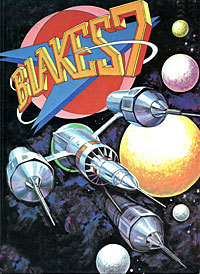 Yes, yes, I hear you: "Enough with the blog posts about random stuff you like, give us…" Actually I have no idea. If there's something in particular you think I should be blogging about, feel free to leave a comment.
Yes, yes, I hear you: "Enough with the blog posts about random stuff you like, give us…" Actually I have no idea. If there's something in particular you think I should be blogging about, feel free to leave a comment.
For now though: more random stuff I like. One brand new, one golden oldie. For the latter, I give you Blake's Seven.
Seriously, Blake's Seven. Because I like Dr Who (and of course series creator Terry Nation had a rather important role in that too), but I like B7 so much more. And let's face it, it takes a lot to outdo a show that literally has all of time and space as its canvas.
My wife's been watching B7 again recently, and I have been happily reminded of just how well the show stacks up even now. This is a show, like Who, where the sets wobble, or are gravel pits; where the guns would look dodgy to cosplayers; where the early spaceship shots were not even models but basically cardboard cutouts. And it's brilliant. This is a salutary lesson, really. Budgets don't make you great. You only have to look at the Transformers franchise for that. What makes a show truly enduring is the writing and the characters. This isn't some long-lost secret of the elder days of television. There are plenty of series that have succeeded recently on just these merits, despite what seems to be a prevailing belief in the movie industry that an excess of money can make up for a general lack of love and care.
Blake's Seven is built on its characters. Everyone remembers Paul Darrow's Avon and Jacqueline Pearce's Servalan — and rightly so. Both are performances par excellence. They are two among many, though. Villa, Jenna, Travis, Blake himself all grow into enduring and well-realised individuals. And yes, there are some failings — one feels that the showrunners didn't know quite what to do with Gan or Cally (the two crewmembers with "exceptional powers", interestingly — strength and telepathy), just as Farscape would run out of things to do with Zan for perhaps the same reason. At the same time, the show made a particular triumph of making people out of the mechanical — Zen, Orac and the lugubrious Slave were all as important as any of the humans, and although Star Wars (just one year before!) had its droid characters, the computer intelligences of B7 were a remarkable achievement for characters lacking even a mobile body. Peter Tuddenham (who voiced all three) is a true pioneering SF hero. I was going to say something here about the contrast with Dr Who, where artificial intelligence, robots and cyborgs (including the Dr's two greatest enemies) generally equated evil. However K9 was introduced in the Invisible Enemy the year before B7 started, so it's nowhere near so clear cut.
And of course Dr Who is back on our screens and, despite persistent rumours of a reboot, we have yet to see a new B7 (I want to say, "Do we really want one?" but that's probably the old man in me). And yet, I rather feel we have, in a way, because there have been some real spiritual successors to Blake over the years. One key thing here is the set-up — there's a stark contrast to Star Trek, and possibly a strong influence from Star Wars, but the Liberator crew aren't even rebels, with the exception of Blake. They're criminals, bound together by common adversity and self-interest, and that makes for a much more interesting dynamic and more varied plots — we love the escapades of rogues. It's easy to see Blake and the gang in, for example, the crew of Moya as they struggle to escape the Peacekeepers in Farscape, and in the Serenity crew of Firefly as well. More recently, the bickering, diverse and fractious Guardians of the Galaxy are very much from the same mould — and again show that it's not about the CGI or the explosions, but a sharply written script that pays attention to where the characters are coming from and who they are.
So, what's the somthing new?
 Unconnected with Blake's Seven, I wanted to flag up an anthology I've just finished, and which I'm in. So there's my declaration of non-neutrality, I guess. Yes, I am in Fox Spirit's Wicked Women, but seriously, with or without me, it is a sterling connection. Juliet McKenna and Gaie Seabold bookend the collection with very solid additions to their existing canons — Einarinn and Babylon Steel respectively, and in the middle is a remarkable range of stories centring — in many different ways — about the titular concept. I don't think there's a weak story in the set, but I particularly enjoyed the slow-burn ambiguous creepiness of Tom Johnstone's'Kravolitz' and Jaine Fenn's crooked fairy tale 'Down at the Lake', which I had the pleasure of hearing the author read at Bristolcon. Stephanie Burgis's story of post-revolution France was also particularly good, a very nice take on a familiar topic. My absolute favourite was Zen Cho's 'The First Witch of Damansara', however, an exploration of family, grief and tradition that was funny and tear-jerking all in one, and left me quite envious at the depth of characterisation the author managed in just a few pages. Obviously, I always recommend things I'm in, because I'm only human, but speaking as a reader, more than a writer, I really enjoyed this collection and heartily encourage you to give it a try.
Unconnected with Blake's Seven, I wanted to flag up an anthology I've just finished, and which I'm in. So there's my declaration of non-neutrality, I guess. Yes, I am in Fox Spirit's Wicked Women, but seriously, with or without me, it is a sterling connection. Juliet McKenna and Gaie Seabold bookend the collection with very solid additions to their existing canons — Einarinn and Babylon Steel respectively, and in the middle is a remarkable range of stories centring — in many different ways — about the titular concept. I don't think there's a weak story in the set, but I particularly enjoyed the slow-burn ambiguous creepiness of Tom Johnstone's'Kravolitz' and Jaine Fenn's crooked fairy tale 'Down at the Lake', which I had the pleasure of hearing the author read at Bristolcon. Stephanie Burgis's story of post-revolution France was also particularly good, a very nice take on a familiar topic. My absolute favourite was Zen Cho's 'The First Witch of Damansara', however, an exploration of family, grief and tradition that was funny and tear-jerking all in one, and left me quite envious at the depth of characterisation the author managed in just a few pages. Obviously, I always recommend things I'm in, because I'm only human, but speaking as a reader, more than a writer, I really enjoyed this collection and heartily encourage you to give it a try.
Share this



